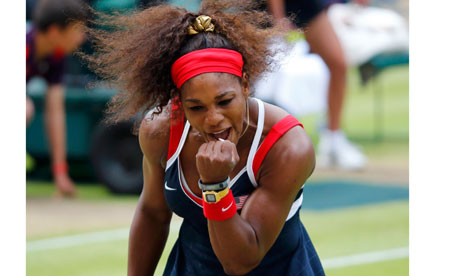
Only a few weeks after the close of the Olympics, I feel cheated. I thought the world was supposed to have changed. Women with muscles were supposed to be the new role models, we were told. Without even trying, Locog had left us with a new Olympic legacy – goodbye Kim Kardashian, hello Jessica Ennis.
There are two things that seeing female athletes can do for women. One is to bring western ideals of the female body closer in line with the rest of the world. In West Africa, where I live, female celebrities look healthy. Size zero women – so far still a foreign concept here – often don't. You can't compete in the Olympics if you have been living on lettuce and steamed fish alone. I began to wonder whether the healthy-looking woman could become a new global standard for beauty.
But the other thing about female athletes is that they are strong. They have muscles. Therefore, in my logic, this new Olympic legacy was going to make the muscular woman socially acceptable, even – dare I say it – desirable. And my crude logic goes further. If society looks up to physically strong women, I thought, that sends subliminal messages about the desirability of being a woman who is strong in other ways, too.
It has taken mere weeks for these illusions of mine to come crashing down. And my wake-up came in the form of a TV interview with Serena Williams last week. The tennis superstar was on an all-women panel on CNN. After being asked by host Donny Deutsch whether she enjoys spanking her male partners, Serena was told how intimidating she is. The obvious reason was because she is physically strong.
I don't want to take Deutsch too seriously; he is after all the man who suggested the only reason the world was interested in Sarah Palin was because she is "so hot" – a statement so wrong on so many levels. But there is serious form when it comes to the media and the Williams sisters. Ever since they first started winning everything, it was as if they were wild beasts who had escaped the jungle and landed right inside lawn tennis.
This recent article by Piers Morgan perfectly summarises this tone. Describing an early glimpse of Serena, he wrote: "I once watched her destroy a young, tiny European waif so brutally on Centre Court at Wimbledon that I wanted to run out and protect her poor victim with a shield."
Ironically, this was Piers Morgan's way of beginning an article about how wonderful he thinks Serena is, as if he discovered her humanity in spite of her brutish appearance. This is, I think, mainly because she is so physically strong. The fact that she is black doesn't help either: there is a long history of black women being regarded as intimidating and – as long as femininity was associated with being helpless and frail – less feminine. And now it seems that, Olympics or no Olympics, for a woman to be big, black and have biceps is still more than some people can cope with.
And you don't have to be anything close to a grand slam champion to have experienced this. Confident women of all races are always getting told how intimidating we are.
To the extent that I have experienced this, I have responded with defiance. I like to go to the gym and lift weights. Like a growing number of women, I discovered the advantages of pumping iron for my skeleton, posture and overall physical effectiveness. I learned to do cleans and presses, and was outraged to discover that many boys learn these lifts in school while women are messing around playing netball. I mean, netball is fine, but how many women have found it to be a useful life skill? And can it really help you carry a heavy baby around?
I had hoped that, post-Olympics, women who look strong might not have to deal with stupidity any more. But it looks like I was wrong.
Email Afua at afua.hirsch@theguardian.com or visit theguardian.com/profile/afuahirsch for all her articles in one place. Follow Afua on Twitter @afuahirsch

